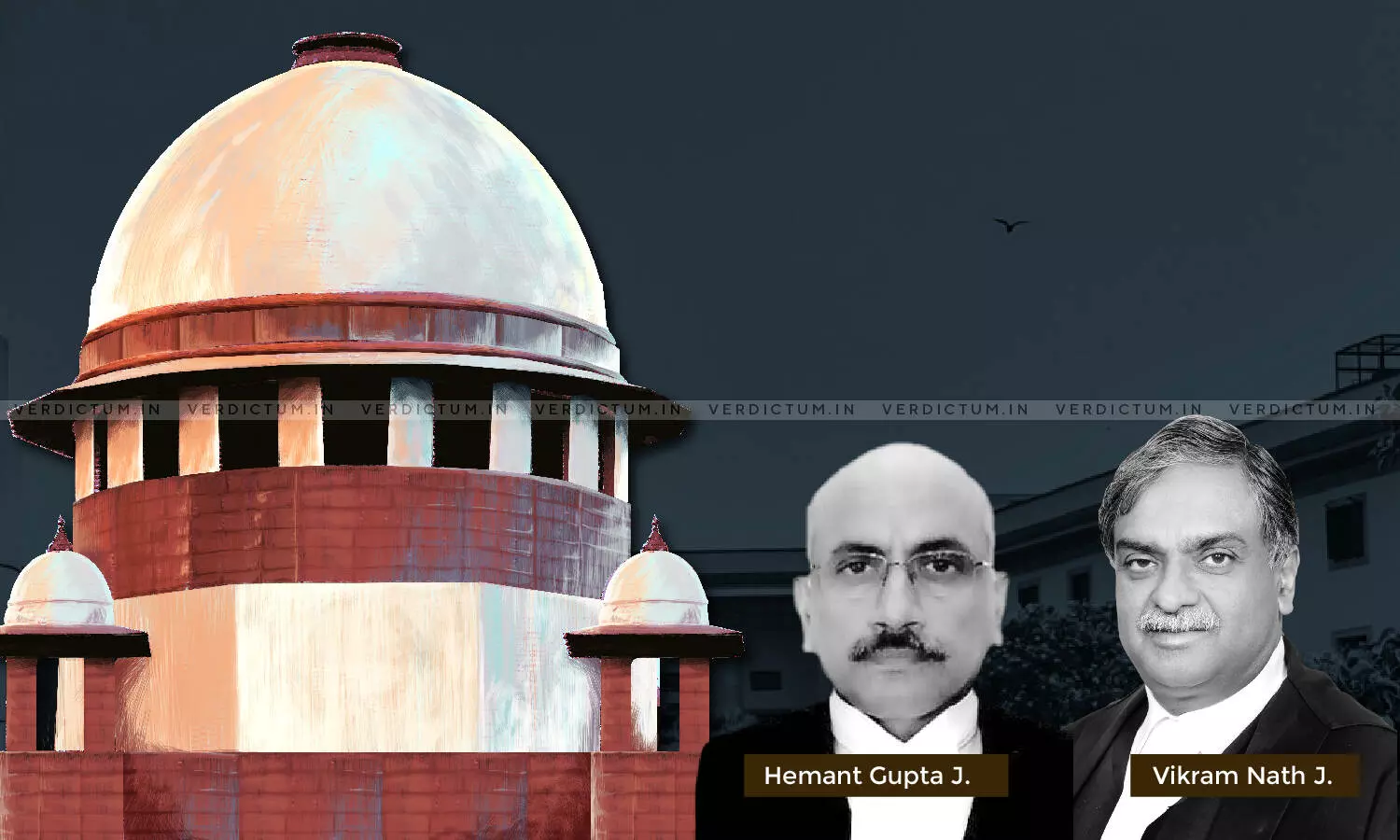
Inter-Departmental Communications Cannot Be Relied Upon As Basis To Claim Any Right: Supreme Court
 |
|The Supreme Court has observed that inter-departmental communications cannot be relied upon as a basis to claim any right.
"It is well settled that inter-departmental communications are in the process of consideration for appropriate decision and cannot be relied upon as a basis to claim any right.", the Bench of Justice Hemant Gupta and Justice Vikram Nath observed.
The facts of the present case were that one Bheru Lal while serving as a Sepoy in the Indian Army suffered an injury on the right leg which led to the amputation of his right foot. He was thereafter invalidated out of service.
As per Rajasthan Special Assistance to Disabled Ex-Servicemen and Dependants of Deceased Defence Personnel (Allotment of Lands) Rules, 1963, there was a provision of allotment of land upto 25 Bighas of irrigated or 50 Bighas of unirrigated land.
Bheru Lal applied for allotment of land in the category of disabled war personnel. The Soldier Welfare Section of the Revenue Department of the State sent a letter to the District Collector, Udaipur wherein it was conveyed that it has been decided to allot 25 Bighas in Village Rohikhera, Tehsil Vallabhanagar.
Bheru Lal died and his wife-writ petitioner, succeeded the estate of her husband. While working in the Headquarters of DGNCC, his wife submitted a representation that the possession of the land has not been handed over either to her husband or to her.
The District Collector communicated to the Sub-Divisional Officer that the land has not been registered in the name of the husband of the writ petitioner, nor such case was found at the level of Sub-Division and Tehsil.
It was proposed that the case be put up in the Vigilance Sub-Division Level Committee in view of the fact that the land stood allotted to different persons.
The writ petitioner communicated that she has no objection if alternative land is allotted to her. The District Collector communicated to the District Soldier Welfare Officer that the question of allotment of land to the writ petitioner is under consideration.
The writ petitioner raised a grievance that the possession of the land allotted has not been handed over to her husband or to her.
The Single Judge found that the alternative land offered to the writ petitioner is located at a very remote/far off area and is not cultivable and therefore, a direction was issued to give possession of the land originally allotted to the writ petitioner.
The allottees who were allotted the land as mentioned in the report challenged the order passed by the High Court when an attempt was made to evict the appellants from the said land which was cultivated by them allegedly for more than 60 years.
Advocate Dharmendra Kumar Sinha appeared for the appellants whereas Advocate Pragati Neekhra appeared for the respondent-State. Advocate Udita Singh appeared for the writ petitioner.
The Supreme Court noted thus "The High Court had gone out of the way to order possession of land which was never proceeded with letter of allotment in favour of the writ petitioner. The approach of the High Court is most unfortunate."
The Court held that inter-departmental communications cannot be relied upon as a basis to claim any right.
The Court observed that before something amounts to an order of the State Government, two things are necessary- First, the order has to be expressed in the name of the Governor as required by clause (1) of Article 166 and second, it has to be communicated.
The Court noted that "…no formal order modifying the decision of the Revenue Secretary was ever made. Until such an order is drawn up, the State Government cannot, in our opinion, be regarded as bound by what was stated in the file."
The Court held that an inter-departmental communication cannot be treated to be a letter of allotment. The Court further emphasized that even if it is considered to be a letter of allotment, the writ petitioner could not claim possession on the basis of such communication after more than 30 years in terms of the Rules applicable for allotment of land to the disabled ex-servicemen.
The Court observed an extra interest by the High Court, and not in respect of mere allotment of land but also of the land which was once allotted.
"The manner in which the matter has been dealt with by the High Court under the guise of help to disabled ex-serviceman is wholly unwarranted.", the Court noted.
"…we find that the writ petition filed by the writ petitioner is wholly misconceived, mischievous with collateral motives and may be having the patronage of the officers/officials.", the Court held while setting aside High Court's Order.
Cause Title- Mahadeo & Ors. v. Sovan Devi & Ors.
Click here to read/download the Judgment